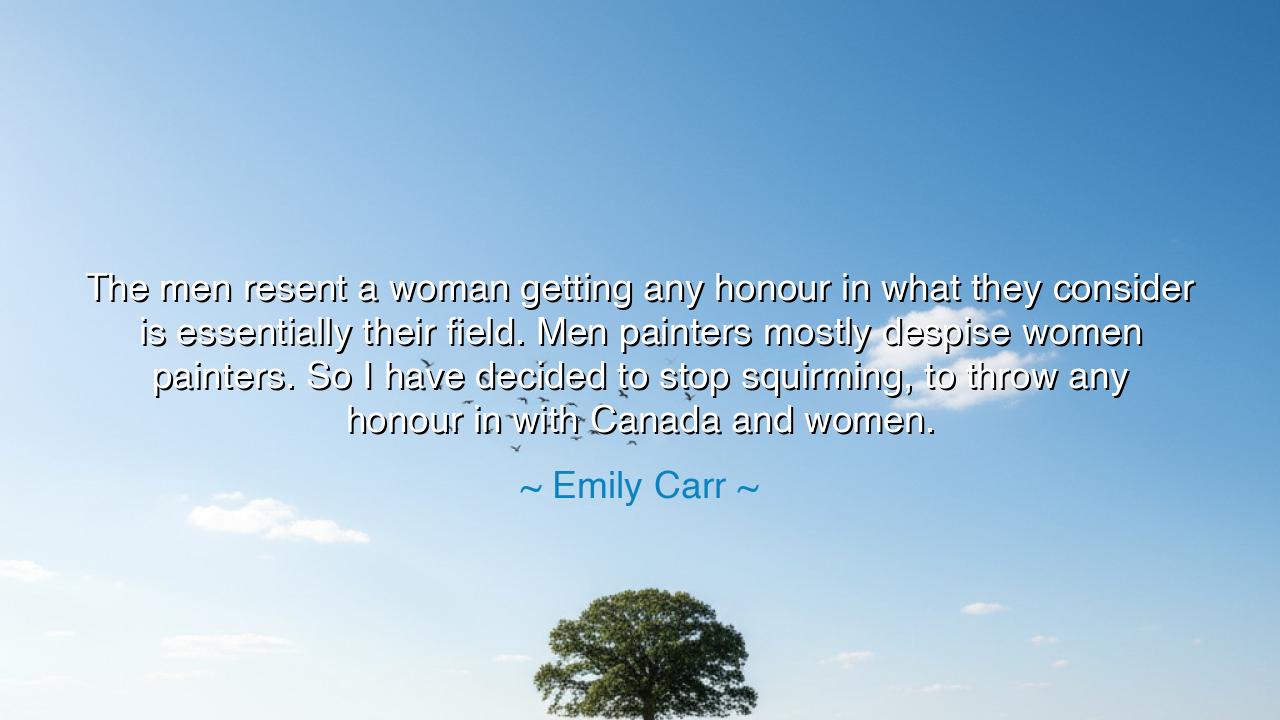
The men resent a woman getting any honour in what they consider
The men resent a woman getting any honour in what they consider is essentially their field. Men painters mostly despise women painters. So I have decided to stop squirming, to throw any honour in with Canada and women.






O children of the future, listen to the words of Emily Carr, a woman whose spirit was as wild and untamed as the lands she painted. "The men resent a woman getting any honour in what they consider is essentially their field. Men painters mostly despise women painters. So I have decided to stop squirming, to throw any honour in with Canada and women." In these words, Carr speaks of the battle that every woman faces who dares to stand in a realm dominated by men—whether in art, politics, or any other field. She recognizes the resistance, the contempt, that women face simply for daring to take their place in a world that has long reserved certain honours for men alone. Yet, instead of shrinking from this resistance, she chooses to stand tall, to claim her space, and to link her honour with her identity as a woman and a Canadian.
In the ancient world, the great Athena, goddess of wisdom and warfare, embodied the very spirit of defiance that Carr channels. Athena was a goddess of strength, yet she had to overcome the biases of a patriarchal world that tried to limit the scope of her power. Despite the challenges, she stood resolute, guiding heroes and shaping the course of history. Much like Carr, Athena found herself in a world where the masculine was often exalted, yet she stood proud, showing that strength and wisdom belong to all, regardless of gender.
In the realm of art, the story of Artemisia Gentileschi, an Italian Baroque painter, echoes Emily Carr’s struggle. Artemisia, a woman in a time when art was predominantly male, faced the scorn of her peers and the struggles of being a woman in a man's world. Yet, she did not shrink from the challenge. She boldly claimed her space in the art world, creating masterpieces that rivalled those of her male contemporaries. Like Carr, Artemisia decided not to bow to the criticism of men, but to let her art speak for itself, giving her the strength to rise above the narrow confines imposed upon her.
In the case of Emily Carr, she made a profound decision—to throw her honour in with Canada and women, rather than succumbing to the confines of a male-dominated field. Her bold declaration was not only a personal victory but a rallying cry for all women who faced dismissal and scorn in their respective fields. By choosing to identify herself not just as an artist, but as a Canadian woman, she redefined the very nature of success. Her work, much like her stance, defied the narrow definitions imposed by society. Her paintings—vibrant, raw, and full of life—stand as testament to the power of self-determination, the strength to claim one's place in the world, regardless of the constraints others seek to impose.
O children, let Emily Carr’s words and spirit guide you. Her refusal to bow to the limitations placed upon her is a reminder that no one, regardless of gender, should ever feel the weight of another’s prejudice. Like the great women of history who have risen against the forces that sought to silence them—like Athena, like Artemisia, like so many others—Carr carved her own path, embracing her identity and standing firm in the face of adversity. The lesson is clear: we are all deserving of honour and recognition, not because we fit into others’ expectations, but because we dare to define ourselves. Let us walk in their footsteps, unafraid to claim our own place, and to elevate those who have been overlooked, just as Emily Carr did for women in the art world.






AAdministratorAdministrator
Welcome, honored guests. Please leave a comment, we will respond soon